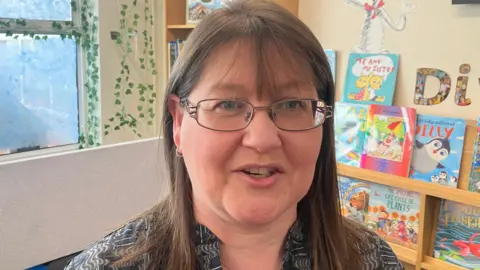'Workload is the biggest issue' - NI teachers
 BBC
BBC"For many, many years teachers and schools and education in general have existed on goodwill."
Tracey Roleston is a P7 teacher at Bridge Integrated Primary in Banbridge, which has around 420 pupils.
She is not surprised that teachers rejected a 5.5% pay deal on Thursday and are due to begin action short of a strike.
Unions have said the rejection of the pay offer may have been influenced by misinformation on social media.
But for many teachers, like Ms Roleston, the increasing demands on teacher's workloads have not been tackled.
"On the ground, it's teachers and workload that is the biggest issue," she told BBC News NI.
"We cannot exist and do the job in the time that's been allocated to us.
"There are cuts in other services that have had significant impact on schools which means that there are more layers added onto our day to day job."
Unpaid overtime

Bridge Integrated Primary's principal, Teresa Devlin, said that teachers now had many more responsibilities and were asked to do much more than when she started teaching.
"We might be counsellors, we could be social workers, we could be doctors, we could be nurses, we could be physiotherapists, we could be OTs," she said.
"We have all of these different hats that we have to wear all the time.
"Add to that your main job which is teaching, and I think this why people don't understand why workload has become such an issue."
Ms Devlin added that "realistically most teachers will do a minimum of 10 hours overtime a week".
"So when you total that up over 40 weeks, that's 400 hours of overtime that is unpaid and no-one else that's in any other job is expected to do that."
SEN support
There has also been a significant rise in the number of pupils with Special Educational Needs (SEN) across all schools in recent years.
"In terms of SEN if the other agencies are unable to meet the children's needs, the parents where do they come to?" Ms Roleston said.
"They have a good relationship with the school, we have an open-door policy, and it's the staff who are then taking those phone calls."
She said that staff would never say no to a parent if they wanted to talk about help for their child or refuse to take their calls, but it all added to the work teachers did.
And that meant working well over her contracted hours, even during the school day.
"We're entitled to a half hour lunch break, if I take 10 to 12 minutes for my lunch that's the height of it," she said.
"We are not minute-counters and that has never been the case in education, but we are being forced down that route.
"Our car park does not empty to almost five o'clock and people take things home."
'I take work home'

Paul Scowcroft has been a teacher for 25 years. He teaches P6 in Bridge Integrated Primary, and has run an after-school film club.
He also said there were more demands on teachers than ever before.
"The variety of pupils you have within the classroom and the variety of needs, you have to plan for those abilities," he said.
"Sometimes you have to fill in paperwork that goes to social services, or for outside agencies.
"That adds lots of time to your planning, because you want to plan a lesson for a class that they're all going to be enthused by, they're all going to get something out of.
"You have to plan for all the varieties of children within the class."
He said teachers worked for many more hours than they were in the classroom.
"Quite often I'm taking work home, sitting at the kitchen table whether it be marking or planning or revising plans or filling in certain forms," he said.
"I'm quite often spending most of my time in the kitchen rather than spending time with my family, and I do it because I'm professional, because I want to give the children in my care the best."
'Long-term impact'
In a letter to teachers on Thursday night, the teaching employers - which includes the Department of Education, Education Authority and the Council for Catholic Maintained Schools - criticised the decision by teachers to take action short of strike.
Action short of strike is likely to affect some school activities like school meetings, meetings with parents, administrative tasks, school inspections, planning and participation in board of governors' meetings.
The management letter said action short of strike would have "a corrosive and long-term impact" on pupils in schools.
It said that by taking part in it "teachers will not be meeting their full contractual obligations".
That letter, though, has not gone down well with many teachers.
So while both unions and management have said they will talk more to try to resolve the dispute, that is unlikely to be straightforward.
